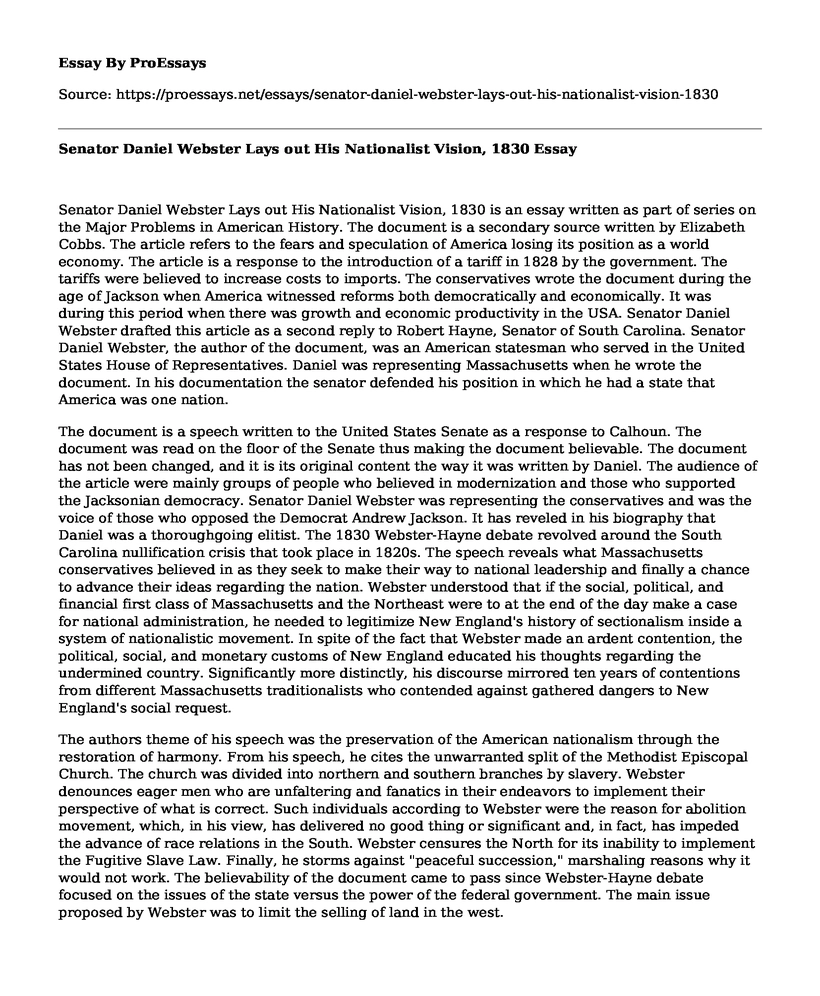Senator Daniel Webster Lays out His Nationalist Vision, 1830 is an essay written as part of series on the Major Problems in American History. The document is a secondary source written by Elizabeth Cobbs. The article refers to the fears and speculation of America losing its position as a world economy. The article is a response to the introduction of a tariff in 1828 by the government. The tariffs were believed to increase costs to imports. The conservatives wrote the document during the age of Jackson when America witnessed reforms both democratically and economically. It was during this period when there was growth and economic productivity in the USA. Senator Daniel Webster drafted this article as a second reply to Robert Hayne, Senator of South Carolina. Senator Daniel Webster, the author of the document, was an American statesman who served in the United States House of Representatives. Daniel was representing Massachusetts when he wrote the document. In his documentation the senator defended his position in which he had a state that America was one nation.
The document is a speech written to the United States Senate as a response to Calhoun. The document was read on the floor of the Senate thus making the document believable. The document has not been changed, and it is its original content the way it was written by Daniel. The audience of the article were mainly groups of people who believed in modernization and those who supported the Jacksonian democracy. Senator Daniel Webster was representing the conservatives and was the voice of those who opposed the Democrat Andrew Jackson. It has reveled in his biography that Daniel was a thoroughgoing elitist. The 1830 Webster-Hayne debate revolved around the South Carolina nullification crisis that took place in 1820s. The speech reveals what Massachusetts conservatives believed in as they seek to make their way to national leadership and finally a chance to advance their ideas regarding the nation. Webster understood that if the social, political, and financial first class of Massachusetts and the Northeast were to at the end of the day make a case for national administration, he needed to legitimize New England's history of sectionalism inside a system of nationalistic movement. In spite of the fact that Webster made an ardent contention, the political, social, and monetary customs of New England educated his thoughts regarding the undermined country. Significantly more distinctly, his discourse mirrored ten years of contentions from different Massachusetts traditionalists who contended against gathered dangers to New England's social request.
The authors theme of his speech was the preservation of the American nationalism through the restoration of harmony. From his speech, he cites the unwarranted split of the Methodist Episcopal Church. The church was divided into northern and southern branches by slavery. Webster denounces eager men who are unfaltering and fanatics in their endeavors to implement their perspective of what is correct. Such individuals according to Webster were the reason for abolition movement, which, in his view, has delivered no good thing or significant and, in fact, has impeded the advance of race relations in the South. Webster censures the North for its inability to implement the Fugitive Slave Law. Finally, he storms against "peaceful succession," marshaling reasons why it would not work. The believability of the document came to pass since Webster-Hayne debate focused on the issues of the state versus the power of the federal government. The main issue proposed by Webster was to limit the selling of land in the west.
Sen. Hayne started debating for states' rights to do with their region whatever they chose. Sen. Webster blamed him for having ulterior motives to fortify the South and its economy and started contending that the United States was not a country of states but rather of individuals. The general population as a country, not the state governments as distinct entities, must choose what to do with federal law. Even though Websters claims were not taken keenly, thirty years later he was vindicated when there was a civil war, and it had resulted from the state not going with the original plan of limiting the sale of western lands.
Bibliography
Merchant, Carolyn, ed. Major problems in American history: documents and essays. Wadsworth
Publishing Company, 2005.
Fields, Wayne. "The Reply to Hayne: Daniel Webster and the Rhetoric of Stewardship." Political Theory 11, no. 1 (1983): 5-28.
Sheidley, Harlow W. "The Webster-Hayne Debate: Recasting New England's Sectionalism." The New England Quarterly 67, no. 1 (1994): 5-29.
Aaron, Daniel. The unwritten war: American writers and the Civil War. University of Wisconsin Press, 1987.
Cite this page
Senator Daniel Webster Lays out His Nationalist Vision, 1830. (2021, Mar 23). Retrieved from https://proessays.net/essays/senator-daniel-webster-lays-out-his-nationalist-vision-1830
If you are the original author of this essay and no longer wish to have it published on the ProEssays website, please click below to request its removal:
- The Wall Street Crash of 1929 and the Great Depression - Essay Sample
- Essay on Egyptian Life after Death
- Comparative Analysis of American Indian History Essay
- Essay Sample on Post-war Economic Changes in America
- Greeks & Persians: Cross-Fertilization & Conflict (499 BC) - Essay Sample
- Essay on US Govt's WWII Decision to Draft Japanese-Americans: Justified?
- Essay Example on the American Civil War: A Historic Struggle Over Slavery







